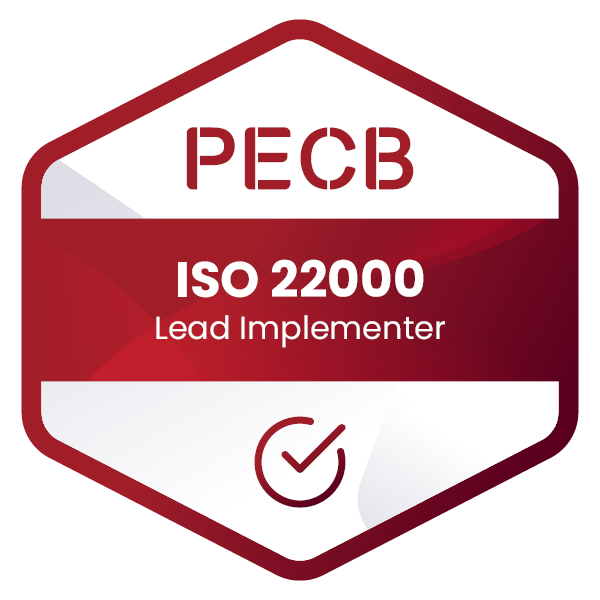Course Overview
The age of globalization has brought new challenges to all industries, and the food industry is no exception. The origin and safety of food products is a main concern in today’s market. It has become increasingly difficult to have proper knowledge on the production methods and origin of food products. Internationally recognized food safety measures are no longer a privilege; they have become a basic requirement for all organizations that deal with food production or service.
The implementation of a food safety management system (FSMS) is a strategic decision for ensuring the safety of food delivered to the consumer. This training course, developed by PECB, aims to help participants develop the knowledge and skills necessary to support an organization in establishing, implementing, managing, and maintaining an FSMS based on ISO 22000 and other best practices. Implementers play a key role in an organization’s ability to successfully implement and maintain an FSMS.
The training course is followed by the certification exam. If you pass, you can apply for the “PECB Certified ISO 22000 Lead Implementer” credential. The “PECB ISO 22000 Lead Implementer” certificate is internationally recognized. It validates your professional capabilities and competences to implement an FSMS in an organization based on the requirements of ISO 22000.
Key Features Of ISO 22000 Lead Implementer Certification
- Expertise in developing and implementing food safety management systems
- Knowledge of ISO 22000 standards and requirements
- Skills in conducting food safety risk assessments and audits
- Ability to design and maintain effective food safety programs
- Ensuring compliance with international food safety regulations and standards.
Why Choose CounselTrain for ISO 22000 Lead Implementer Training in Saudia Arabia?
Choosing CounselTrain for ISO 22000 Lead Implementer Training in the Saudia Arabia offers several advantages. CounselTrain provides expert-led training programs that cover all aspects of food safety management systems and ISO 22000 standards. Participants benefit from a comprehensive curriculum, practical insights, and hands-on experience in implementing food safety management systems. CounselTrain’s trainers are experienced professionals in food safety and implementation, ensuring a high-quality learning experience. Additionally, CounselTrain’s certification is globally recognized, providing participants with industry-relevant skills and credentials. The supportive learning environment, access to resources, and post-training support further enhance the value of choosing CounselTrain for ISO 22000 Lead Implementer Training in the Saudia Arabia.
Target Audiance
- Managers or consultants involved in food safety management
- Expert advisors interested in mastering the implementation process of a food safety management system
- Individuals responsible for maintaining conformity to the FSMS requirements in an organization
- FSMS team members
ISO 22000 Lead Implementer in Saudia Arabia
The ISO 22000 Lead Implementer course in the Saudia Arabia (Saudia Arabia) is designed to equip professionals with the knowledge and skills required to implement food safety management systems effectively. This course covers essential topics such as food safety principles, ISO 22000 standards, risk assessment, and control measures. Participants learn how to develop, implement, and maintain food safety programs in compliance with international standards. The ISO 22000 Lead Implementer course in the Saudia Arabia is ideal for individuals responsible for ensuring food safety and quality within organizations, preparing them to lead food safety initiatives and achieve ISO 22000 certification.


 4.8
4.8